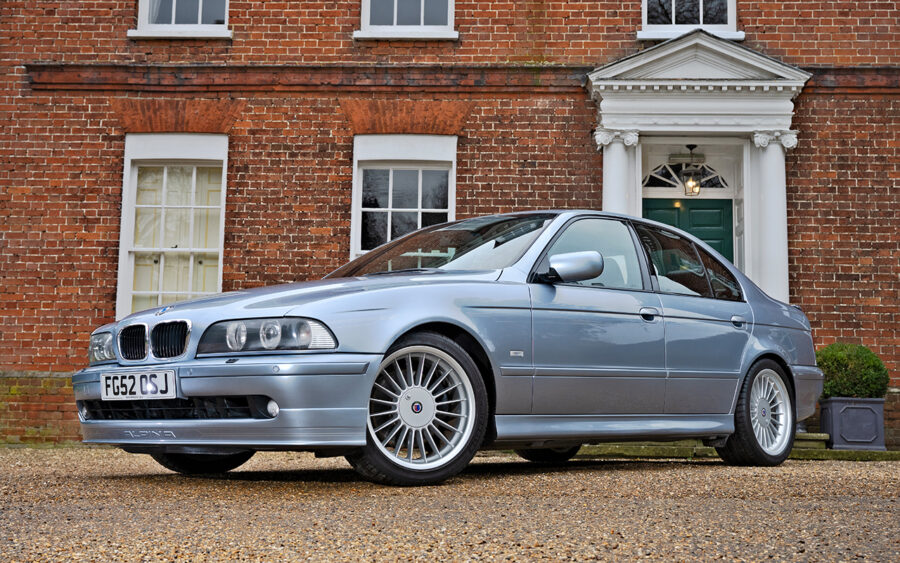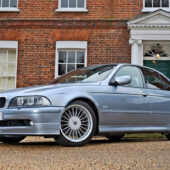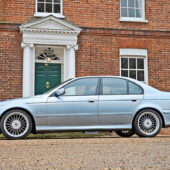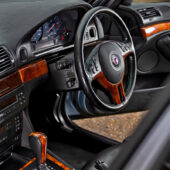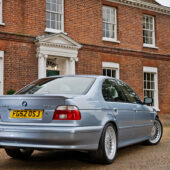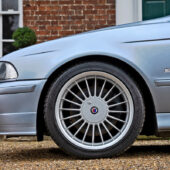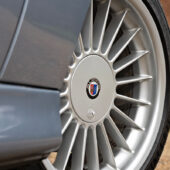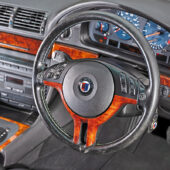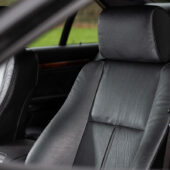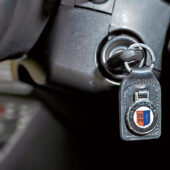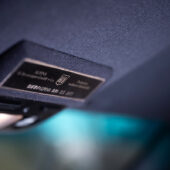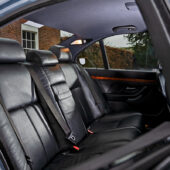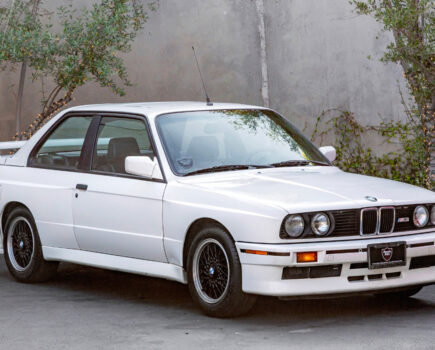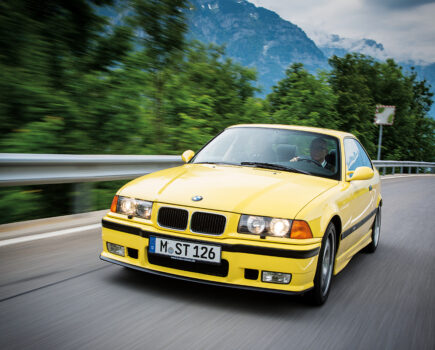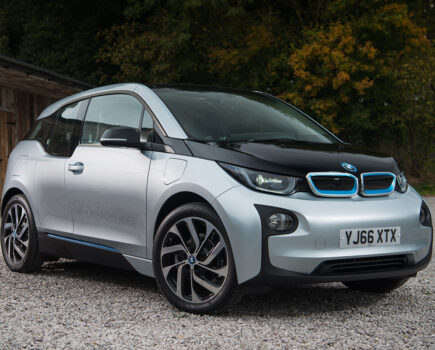The sublime Alpina B10 3.3 might just be the ultimate incarnation of the E39 5 Series. Here’s how it came to be
Words: Bob Harper Images: Jason Dodd With thanks to: Peter Moore, Quick and Big
It’s a testament to how well the E39-generation 5 Series has stood the test of time that nigh-on 30 years since its launch, the good old ‘best car in the world’ epithet is still going strong. The Fives that have followed have all been great cars, but none have caught the imagination quite so successfully as the E39, with its near-perfect blend of performance, space, ride, handling and subtle good looks. Good though the E39s undoubtedly were, there’s always room for a little bit of additional spice, and, as usual, if you wanted a fitter and faster E39, it was well worth your while beating a path to Alpina’s door.
Alpina was swift off the mark when it came to fettling the E39, and it wasn’t long after the car’s launch that the first B10 model became available. The V8 was the first of the Alpina B10s to appear in March 1997, and it was naturally enough based on the 540i. To extract more power without the need to resort to forced induction, Alpina asked BMW to cast special blocks based on the 4.4-litre M62 unit, which resulted in a displacement of 4619cc.
There was more to the car than a simple capacity upgrade, though, as Alpina specified a new crankshaft, reprofiled camshafts, lighter, higher compression Mahle pistons and a reprogrammed Motronic control unit, and, in keeping with Alpina tradition, the head was hand-ported at its HQ in Buchloe. The result was 340hp at 5700rpm and 347lb ft of torque at 3800rpm, which was good for claimed performance figures of 0-62mph in 5.9 seconds with a top speed of 172mph, comfortably eclipsing the 540i and not far off the M5 that wouldn’t arrive for another 18 months.
So that was Alpina’s E39 range-topper taken care of, but there were gaps further down the BMW model range that Alpina was keen to exploit. The 528i was a great machine, but its 193hp wasn’t anything to write home about, and while the six-cylinder BMWs were the sweetest-driving models – thanks to their rack and pinion steering – it seemed a shame that there wasn’t a model with the power to best exploit its chassis. Alpina, of course, had the answer with the B10 3.2.
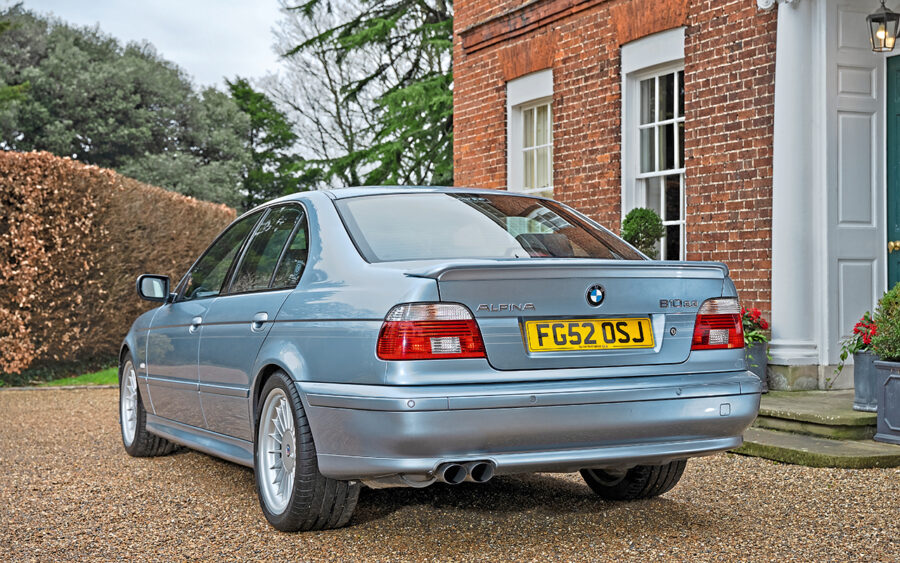
Late in 1997, Alpina launched the B10 3.2, which was based on the then-current 528i. The engine was from the E36 B3 3.2, which meant a 3152cc displacement and power and torque figures of 260hp at 5900rpm and 243lb ft, respectively. The engine was actually based on that used in the US-spec E36 M3 Evolution, which was an iron-block M52 derivative, but the head was all Alpina’s work, along with the expected Mahle lightweight pistons and bespoke Alpina engine management tweaks. Still, with gains of 67hp and 37lb ft over the 528i, the 3.2 was a real flying machine that was almost as quick as a 540i. 0-62mph was quoted as 6.5 seconds, while the top speed was 162mph, which wasn’t to be sniffed at.
As with the B10 V8, a Touring version was also produced, and while performance was blunted slightly by the additional weight, it could still muster a sub-seven-second 0-62mph time. Autocar tested the first car in the UK and came away deeply impressed, despite its £41,950 price tag, which made it a hefty £9000 more than a 528i SE Touring. It concluded the B10 3.2 Touring was a “Pricey but superior alternative to the standard 528i Touring,” and that it was “also a more engaging car to drive and look at than the more expensive 540i wagon.”
Perhaps Alpina could have left it at that, but it’s never been one to rest on its laurels, so it further developed the straight-six to add a little bit more pizazz. In 1999, the 3.2 engine was superseded by the 3.3-litre version, which was again based on the US-spec M3’s unit and shared with Alpina’s E46 B3 3.3 too. The additional capacity – now exactly 3300cc – was achieved by fitting a bespoke crankshaft, but there were further changes than just an increased capacity. There were revised inlet and exhaust manifolds, and a great deal of care was taken to ensure that the 3.3 wasn’t afflicted with the potential imbalance that long-stroke engines can suffer from. The lightweight pistons were matched with a dual-mass flywheel, and that new crank had a bespoke damper to ensure smooth running. It worked, too, with the 3.3 offering 280hp and 247lb ft, which equated to better flexibility and a smidgen more performance.
While the B10 3.2 had only been available with a five-speed manual, the 3.3 was equipped with a six-speed manual ’box with slightly closer-stacked ratios and a longer-legged sixth cog, and later in its life, it was also possible to spec the Switch-Tronic gearbox, too. This carried a price premium of £2000 and offered three different modes – normal drive, sport, and then Switch-Tronic, which allowed the driver to select ratios manually by using the buttons hidden behind neatly stitched ‘up’ and ‘down’ arrows on the steering wheel. For the 2001 model year, BMW carried out a host of changes for the E39, the most obvious of these being the introduction of the much-copied angel-eye headlights. Naturally enough, the Alpina B10s adopted these changes too.
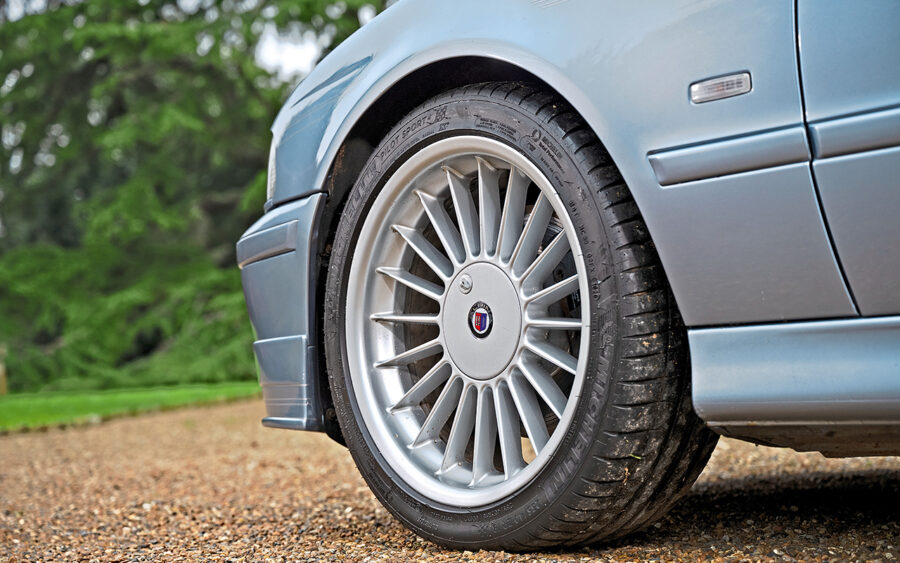
As with all Alpinas, though, there was more to the B10 than just an engine job. The suspension was by bespoke Alpina-specced springs and dampers, while the anti-roll bars were also uprated. The standard wheels were 18” items with 235/40 and 265/35 Michelin rubber, although 19” rims could be chosen from the extensive options list. To differentiate the B10 from run-of-the-mill Fives there was a typically functional Alpina front spoiler, while at the rear, there was an optional boot lid spoiler, too.
Externally, the 3.2 and 3.3 looked virtually identical to the V8 models, although, for the eagle-eyed, the V8s had chromed grille slats, whereas the six-cylinder cars had black plastic items. Unlike all pre-Sport-kitted BMWs, the B10 had two purposeful exhaust pipes that sprouted from under the rear valance. The trademark Alpina decal set could be specced on UK cars, but the vast majority of them did without it.
Inside, the standard spec was fairly restrained, with Alpina-logo’d dials, door sills and that steering wheel as well as the traditional Alpina production plate. If you wanted to have the full-on Alpina stitched seats, that was entirely possible but would add heavily to the cost.
The glorious example you see here is a facelift 3.3 machine, which makes it a pretty rare beast as just 112 3.3 saloons made it over to the UK, along with a further 19 Tourings. It’s finished in Individual Bluewater metallic with a black leather interior and is believed to be the only B10 3.3 produced in this colour. It’s currently for sale at Quick and Big, and along with its unique colour combination, it’s also a low-mileage example, having clocked up just 71k since it was registered in October 2002.
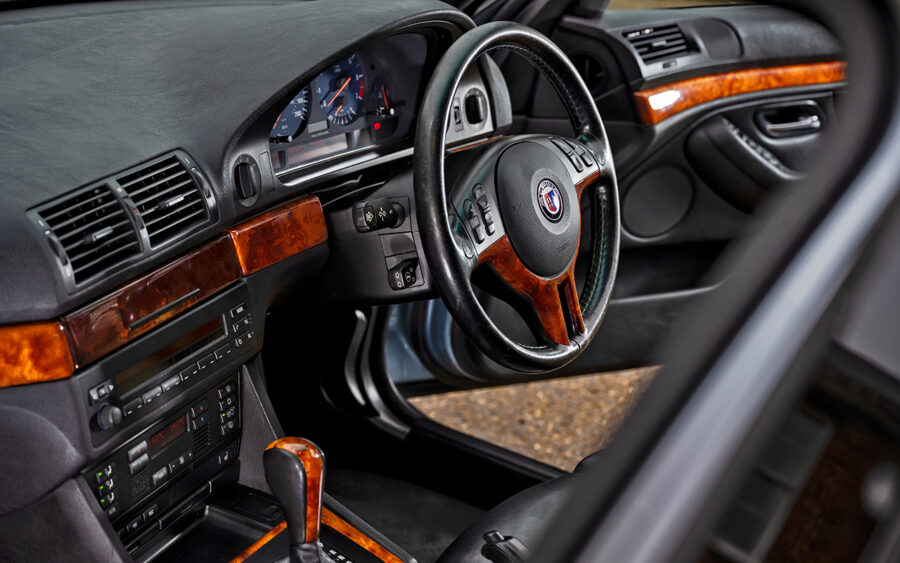
Quick and Big’s owner, Peter Moore, is a huge E39 fan, having owned upwards of 20 examples over the years, and he believes that the B10 3.3 is one of the best. “I always like to look for things that are unique and different, whether it’s as my personal transport or whether it’s for something we can prepare and sell, and the B10 fits that brief perfectly,” he tells us. “The Bluewater looks fantastic, it’s better than plain old metallic silver, and you realise how different the colour is, and when the sun’s out, it really does look superb.”
“It drives beautifully,” he says. “It really does drive as well as it looks in the pictures, and its history and low mileage back it up, and I’m hoping there will be an enthusiast out there who it will suit, but if there isn’t then I’ll keep it. We keep finding these rare things, and the great thing about them from a price point of view is what great value they are. They’re still relatively affordable, especially when you look at the prices that some M5s are making. It’s rarer than an E39 M5; sure, it might never be quite as iconic as an M5, but it is the Alpina take on the M5. It doesn’t brag about its performance, it’s more about individuality, and I love the fact that Alpina takes something from BMW and says: ‘We don’t think that’s good enough, we’ll make it better’. I really hope that some of that doesn’t get lost after BMW’s takeover of Alpina. It would be a crying shame if the Alpina name stopped being unique and different and just became another trim level or styling exercise!”
Just in case the worst-case scenario happens, you could do a lot worse than get on the B10 train before everyone cottons on to how good they are. The B10 3.3 really does offer the best of both worlds, exhibiting all the strengths of the standard E39 but with better performance. To leave it at that, though, would be to do the car an injustice. Where Alpina has always really scored over its BMW counterparts is in providing a blend of ride, handling and road holding that is second to none. Initially, they might seem as if they’re too softly sprung to be able to enthrall when you get to the twisty bits, but they do have excellent body control when pressing on, too. Grip’s immense, thanks to the wide rubber, but the flip side of the coin is that they still retain an excellent ride despite a wheel diameter of at least 18”.
The Alpina B10 V8 might seem like the most obvious choice when looking at a non-M E39, but it would be remiss not to have a try of a B10 3.3. It might not have the ultimate grunt of the V8, but it’s certainly no slouch, and with its rack and pinion steering it’s a much sweeter steer than the bigger-engined models. Performance, superb ride quality, exclusivity – what more could you want from a more focused version of the best car in the world?

